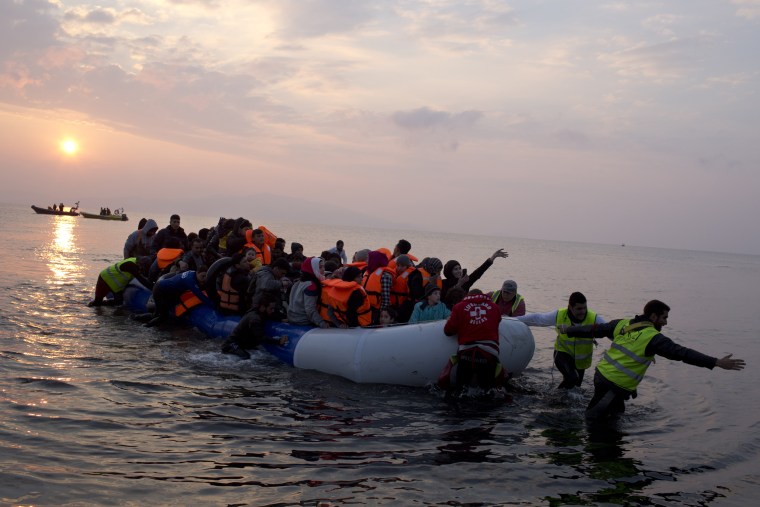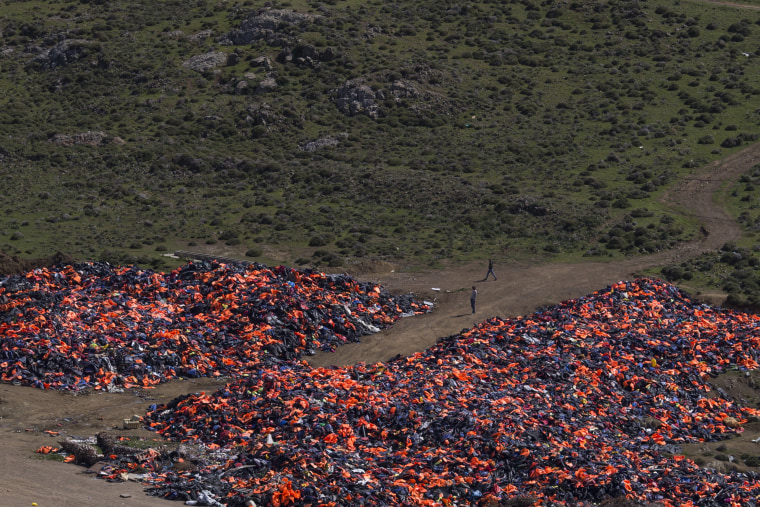ATHENS — Ameer stood on the shore and scrawled three phone numbers on the palm of his hand using a bright blue pen.
The Syrian refugee's mother had forbidden him from setting foot outside of Turkey, so Ameer plotted a secret plan. It was one that would put the lives of his four younger siblings at risk.
Ameer knew better than to tell her that he was leading all five of her children onto a rubber dinghy — crammed between 50 other anxious refugees — that was set attempt to cross deadliest stretch of sea in the world.
He had diligently monitored weather reports, even tide levels, using an app on his phone until he was convinced the timing was right.

Just before climbing aboard, the 22-year-old strapped an orange life jacket across his narrow frame and shot off one last WhatsApp message to a friend so that at least someone who cared knew where he had been.
The markings on his hand might offer the last hope should things go wrong: the numbers for the Red Cross, and two more for the coast guard units in both Greece and Turkey.
“I had a plan that once we get into the territorial waters of Greece, I would contact that coast guards and bring them to take us,” Ameer later recalled. (Ameer requested that his last name not be used amid fears of reprisals against relatives remaining in Syria.)
"We want the war to stop, we want to lead a normal life like everyone else."
One errant wave, and Ameer and his siblings could have been pitched overboard to join the at least 3,800 people who have died while crossing the Mediterranean Sea in the last year.
It’s a gamble that millions of refugees have taken over the last two years, flooding the borders of Western Europe to flee a home ripped by war and buried in rubble.
Only a few years separate Ameer from his siblings in age — the next eldest is 20-year-old Aya, followed by Enas, 18, Elaf, 16, and Mohammad, 14. Still he was forced to assume the role of the family patriarch without their parents around, left to abandon his studies in mechanical engineering to look after them.
Ameer’s father, Nbhan, worked as a security official for the regime of Syrian President Bashar al-Assad. According to relatives, he is believed to have died while being held in the infamous state-run Sadnaya Prison after being arrested for freeing political activists.
Ameer keeps a cool exterior when asked of the journey's perils. However, it was the sounds of distressed, screaming women and children on the boat that eventually provoked his fear.

The boat’s captain lost his nerve in the waters dividing Turkey and Greece. He was a fellow refugee, urged by the smugglers to steer the boat in exchange for free passage to Europe.
But the captain cowered after seeing lights flashed from the Turkish coast guard. He readied to abandon his post.
“The current got really strong and the waves were really high,” Ameer told NBC News. “The most scary thing was the commotion on the boat.”
Ameer and his siblings were attempting to follow their mother’s path to the Netherlands, where she had been living for the last six months as she sought asylum.
The family didn’t have enough money to leave Syria together, so Ameer’s mother had set off on the journey first in hopes to bring her children over to Europe through the official asylum process.
But Ameer couldn’t wait.
“Life in Turkey was so harsh for us,” he said. “We decided to leave for Greece to be reunited with our mom.”
The journey for Ameer and his siblings didn’t start off smoothly. They first fled Syria by foot, crawling through a trench dug at the Turkish border. They squeezed through a hole in the wire fence that separated the two countries, but they were captured by border police.
They were successfully smuggled in on the second try, but not without loss. But Ameer was forced to leave his luggage behind, including the keepsakes and photos that he had clung to since childhood.
“We haven't got much left,” Ameer said.

The five siblings called their mother as soon as they safely reached the shores of the Greek island of Lesbos.
She was blindsided by news of their arrival and cried for nearly two hours, Ameer said, overcome by a mixture of worry and relief.
“It's the newly born feeling at that moment of making it,” Ameer said of his fellow refugees. ”They've left a war-torn zone into somewhere else that is safe."
Ameer began volunteering at Elliniko refugee camp in Athens as a translator. Then their prayers were answered.
On Sunday, after being separated from their mother for an entire year, Ameer and his siblings boarded a plane to the Netherlands to finally reunite. His mother learned she had successfully won her asylum claim with the Netherlands government. The family was given a fresh start in a town called Vledderweg.
"My mother cried and she didn't believe we were really there," he said of their reunion. "It felt like a dream."
For Ameer the news was bittersweet. His ultimate dream of returning to Syria may be further off.
“We want the war to stop, we want to lead a normal life like everyone else,” Ameer said. “We would like to be able to go back to Syria once the war is over.”